

Kindness. Kindness is a virtue in many cultures and religions.

The above picture is from a Laotian temple, depicting the parable of Buddha and the elephant Nalagiri. Devadutta, jealous of Buddha and wanting to hurt him, sends an angry elephant named Nalagiri into a street where Buddha and his colleagues were walking. As the angry Nalagiri approached them, Buddha's loving kindness and friendliness tames Nalagiri. The parable suggests kindness affects everyone. Buddhists call such kindness in virtuous state of perfection as Mettā,[1] while some Indian literature refer to it as maitrī (Sanskrit: मैत्री).[2][3] Religious views on love. Religious views on love vary widely between different religions.
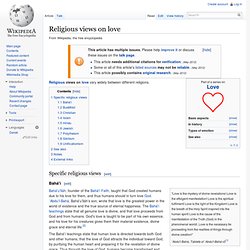
Specific religious views[edit] Zakât. Un article de Wikipédia, l'encyclopédie libre.

La zakât ou zakat ou zakkat (زَكَاة zakāt) ; mot arabe traduit par « purification », est le troisième des piliers de l'islam Le musulman est tenu de calculer chaque année lunaire (hégire) ce montant et de le donner aux plus pauvres dans son pays de résidence. Historiquement, dans les pays islamiques, c'était l’État qui récoltait la zakât et qui la redistribuait. Buts[modifier | modifier le code] Purifier le croyant de son éventuelle attirance malsaine pour les biens, limiter l’avarice et la convoitise. La zakat est le troisième pilier de l'islam et son essence même révèle l'importance de la participation sociale dans l'univers musulman.
Zakât al-Mâl[modifier | modifier le code] Solidarity. Solidarity is unity (as of a group or class) that produces or is based on universities of interests, objectives, standards, and sympathies.[1][2] It refers to the ties in a society that bind people together as one.
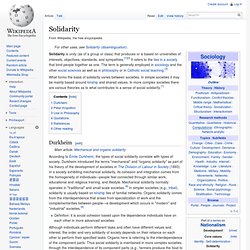
The term is generally employed in sociology and the other social sciences as well as in philosophy or in Catholic social teaching.[3] What forms the basis of solidarity varies between societies. In simple societies it may be mainly based around kinship and shared values. Generosity. In times of natural disaster, relief efforts are frequently provided, voluntarily, by individuals or groups acting unilaterally in making gifts of time, resources, goods, money, etc.
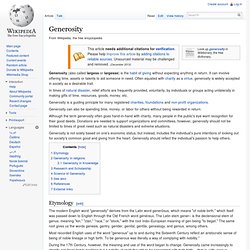
Generosity can also be spending time, money, or labor for others without being rewarded in return. Although the term generosity often goes hand-in-hand with charity, many people in the public's eye want recognition for their good deeds. Donations are needed to support organizations and committees, however, generosity should not be limited to times of great need such as natural disasters and extreme situations. Generosity is not solely based on one's economic status, but instead, includes the individual's pure intentions of looking out for society's common good and giving from the heart. Generosity should reflect the individual's passion to help others. Etymology[edit] During the 17th Century, however, the meaning and use of the word began to change.
Charité. Un article de Wikipédia, l'encyclopédie libre.

Enfin, dans son sens dérivé, « la Charité » est le nom donné à certains hôpitaux ou hospices religieux, dans lesquels ces œuvres de bienfaisance sont réalisées. Charity (virtue) In Christian theology charity, Latin caritas, is by Thomas Aquinas understood as "the friendship of man for God", which "unites us to God". He holds it as "the most excellent of the virtues".[1] Further, Aquinas holds that "the habit of charity extends not only to the love of God, but also to the love of our neighbor".[2] Deus caritas est—"God is love.
" (1 John 4:8) Charity is held to be the ultimate perfection of the human spirit, because it is said to both glorify and reflect the nature of God. Confusion can arise from the multiple meanings of the English word "love". Compassion. Compassion personified: a statue at the Epcot center in Florida Compassion is the response to the suffering of others that motivates a desire to help.[1][2] Compassion is often, though not inevitably, the key component in what manifests in the social context as altruism.
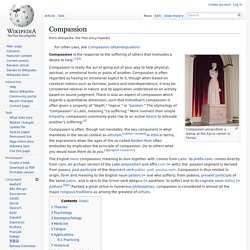
[citation needed] In ethical terms, the expressions down the ages of the so-called Golden Rule often embodies by implication the principle of compassion: Do to others what you would have them do to you.[3][original research?] Solidarité (notion) Altruism. Giving alms to the poor is often considered an altruistic action.
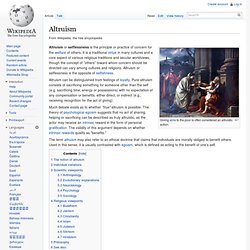
Altruism or selflessness is the principle or practice of concern for the welfare of others. It is a traditional virtue in many cultures and a core aspect of various religious traditions and secular worldviews, though the concept of "others" toward whom concern should be directed can vary among cultures and religions. Altruism or selflessness is the opposite of selfishness. Altruism can be distinguished from feelings of loyalty. Pure altruism consists of sacrificing something for someone other than the self (e.g. sacrificing time, energy or possessions) with no expectation of any compensation or benefits, either direct, or indirect (e.g., receiving recognition for the act of giving).
Much debate exists as to whether "true" altruism is possible. The notion of altruism[edit] The concept has a long history in philosophical and ethical thought. Individual variations[edit] A 1986 study estimated that altruism was half-inherited.